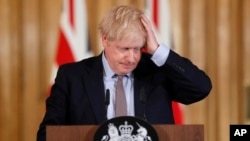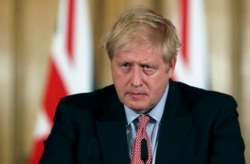British Prime Minister Boris Johnson will step up government action this week in a bid to slow the spread across Britain of the potentially deadly coronavirus by accelerating plans to make the elderly stay at home — possibly for months — and for whole families to self-quarantine when any family member displays COVID-19 symptoms.
The acceleration of planned new social-distancing rules marks the third policy reversal by Johnson in the past four days. The move comes after hundreds of scientists accused the government in an open letter of “risking many more lives than necessary” by delaying the introduction of more restrictive social-distancing measures.
They are urging the government to start locking-down virus hotspots, close schools and order the cessation of flights from other countries affected by the outbreak, as other European countries and the U.S. have done.
Johnson is basing Britain’s COVID strategy partly on the theory of “herd immunity, his critics say. His science advisers last week said there’s little the government can do to prevent the virus spreading and that the best way to protect the public from the virus in the long term is for most of the population to contract it, while shielding the old and vulnerable from catching the coronavirus.
Once about 60% of the population has had the disease, thereby becoming immune in theory from further reinfection, it will provide some protection to those who are not immune because the virus will spread much more slowly or may just die out.
The government’s priority, instead, is to try to slow the rate of the spread of COVID-19 to avoid the public health system from becoming overwhelmed. The ‘herd immunity’ strategy is being championed by Johnson’s chief science adviser, Patrick Vallance, and has become the focus of an increasingly charged debate, with its critics saying it is out of step with the lockdown strategies being adopted by Britain’s European neighbors.
Vallance last week described to British broadcasters how a majority of the country’s population of more than 65 million would need to be infected with the coronavirus for the risk of widespread future outbreaks to be minimized. Speaking on BBC Radio Friday he said: “Our aim is to try and reduce the peak, broaden the peak, not suppress it completely; also, because the vast majority of people get a mild illness, to build up some kind of herd immunity so more people are immune to this disease and we reduce the transmission.”
But many infectious disease experts say it isn’t certain that those who have been infected once, will, in fact, acquire immunity to it or any future COVID-19 strains. There have been several cases recorded in China and Japan of people being re-infected once they have recovered from contracting the virus the first time. They warn following a ‘herd immunity’ approach would mean accepting that more than 40 million people will need to get the disease and that even with a low 1% mortality rate, that would mean a likely 400,000 deaths.
They also say Johnson’s science advisers are being too pessimistic about the chances of developing quickly a vaccine.
“The government is playing roulette with the public,” said Richard Horton, editor of Britain’s The Lancet, a weekly peer-reviewed medical journal. “We need immediate and assertive social distancing and closure policies,” he tweeted. Other critics have compared Vallance to Dr. Strangelove, the character in Stanley Kubrick’s 1964 black comedy movie satirizing the Cold War fears of a nuclear conflict between the Soviet Union and the United States.
“The UK government has inexplicably chosen to encourage the flames, in the misguided notion that somehow they will be able to control them,” says William Hanage, an epidemiologist at Harvard’s Chan School of Public Health. He says he and his colleagues “assumed that reports of the UK policy were satire – an example of the wry humor for which the country is famed. But they are all too real.”
Under an avalanche of criticism, Britain’s health minister Matt Hancock distanced on Sunday the government from Vallance’s ‘herd immunity’ strategy, saying the government's plan is “based on the expertise of world-leading scientists” and that ‘herd immunity is not a part of it. That is a scientific concept, not a goal or a strategy. Our goal is to protect life from this virus, our strategy is to protect the most vulnerable.”
He said the government will be taking “dramatic action” to tackle the virus, including telling manufacturers to build on a “war footing”, ventilators and other health equipment to cope. He said the health service has an estimated 5,000 ventilators but will need “many times more than that.”
“Our generation has never been tested like this,” he added. The plans include preparing the elderly and vulnerable to remain at home, possibly for as long as four months, banning large gatherings, readying the army to be deployed to guard supermarkets and hospitals, and the cancellation of elective surgeries. He said Sunday the government was also not ruling out closing bars, restaurants and non-essential shops. The British government is planning to buy up beds in private hospitals to help the public hospitals.
Opposition politicians and some prominent Conservatives, including Hancock’s predecessor as health minister, Jeremy Hunt, are not assuaged. They are demanding to see the data and disease modeling the government is using to inform its approach and say the differences between between Vallance and Hancock on what the strategy is based on would suggest that Johnson’s doesn’t have a clear plan, despite assuring the public at a press conference last week that he does.
Policy reversals are also prompting public nervousness, opinion polls suggest, with 47% saying the government needed to be doing more. On Thursday, Johnson and his advisers dismissed the idea that it is necessary to ban mass gatherings, saying it was not needed at this stage. Banning large crowds would not have a “big effect” on slowing COVID-19 transmission, Vallance said.
But within hours, most major sporting authorities, including those governing soccer and rugby, suspended all matches. Following that, government ministers effected a U-turn and started telling reporters that mass gatherings would, after all be banned from next week. The government also initially indicated next month’s nationwide municipal elections would go ahead, only to reverse and announce they would be postponed.
Criticism has also mounted of the government’s decision to delay the stay-at-home advice. On Sunday, Hancock told Britain’s Sky News the government did not want to act too soon and lock life down as fatigue would set in and people wouldn’t be able to maintain it. “It's not an easy thing for people to do, it's not an easy thing for people to sustain. But the critical thing is we need to be ready,” he said.
But former Conservative minister Rory Stewart, says the government shouldn’t be delaying action. He has called for schools to be closed. “Evidence from other pandemics is that closing schools and large gatherings earlier rather than later stops the peaks of this kind of disease,” he said.
Some epidemiologists agree that the British government shouldn’t be delaying ramping up restrictions. “Social distancing has worked in China, Singapore and other countries,” says Alan McNally, professor of microbial evolutionary genomics at Britain’s Birmingham University.
Other disease experts, though, support the government’s pacing of measures. According to Michael Head, an epidemiologist at Britain’s Southampton University, restrictions will only work if there is a high level of public compliance. “You won’t get that over a long period of time,” he says.








